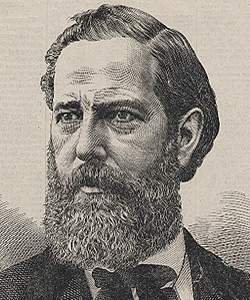William Hayden English (Congressional Biographical Directory)
Reference
ENGLISH, William Hayden, (father of William Eastin English), a Representative from Indiana; born in Lexington, Scott County, Ind., August 27, 1822; pursued classical studies at Hanover (Ind.) College; studied law; was admitted to the bar in 1846 and commenced practice at Lexington, Ind.; principal clerk of the State house of representatives in 1843; clerk in the United States Treasury Department at Washington, D.C., 1844-1848; secretary of the Indiana State constitutional convention in 1850; member of the State house of representatives in 1851 and 1852 and served as speaker; elected as a Democrat to the Thirty-third and to the three succeeding Congresses (March 4, 1853-March 3, 1861); chairman, Committee on Post Office and Post Roads (Thirty-fifth Congress); Regent of the Smithsonian Institution 1853-1861; moved to Indianapolis, Ind., at the end of his congressional term; unsuccessful candidate for Vice President of the United States on the Democratic ticket in 1880; author of several books; died at his home in Indianapolis, Ind., February 7, 1896; interment in Crown Hill Cemetery.
“English, William Hayden,” Biographical Directory of the United States Congress, 1774 to Present, http://bioguide.congress.gov/scripts/biodisplay.pl?index=E000191.
William Hayden English (American National Biography)
Scholarship
Elected to the state house in 1851, [English] was chosen Speaker in March 1852, the youngest person to that date to hold this office and one of only a few Indiana legislators ever to be chosen Speaker during his or her first term. In that same year he was elected to the U.S. House of Representatives, where he remained until retiring in 1861. As a northern Democrat who was sympathetic to the South and slavery but clearly a Unionist, he obtained a degree of prominence. Serving on the House Committee on Territories, English was directly involved in the crucial issues of the era. He supported the Kansas-Nebraska Bill and was one of only seven northern Democrats to survive the 1854 election. Even more challenging was the struggle over Kansas statehood and the proslavery Lecompton constitution. As one of the House members of the congressional conference committee, English crafted a compromise bill, known as the "English Bill." The compromise resubmitted the Lecompton constitution to the voters of Kansas, ostensibly because the congressional measure offered them less land than had been originally requested but most importantly with the threat that, if the constitution were rejected, Kansas statehood would be delayed for some time. The passage of this bill further divided the Democratic party, though it was rejected by Kansas voters. English was reelected in 1858, but he chose not to run in 1860. He made a fruitless journey to the Democratic convention of that year, urging unity and the Union. When secession occurred, he denounced it, but he also declined to accept command of an army regiment.
Philip R. VanderMeer, "English, William Hayden," American National Biography Online, February 2000, http://www.anb.org/articles/05/05-00218.html.





